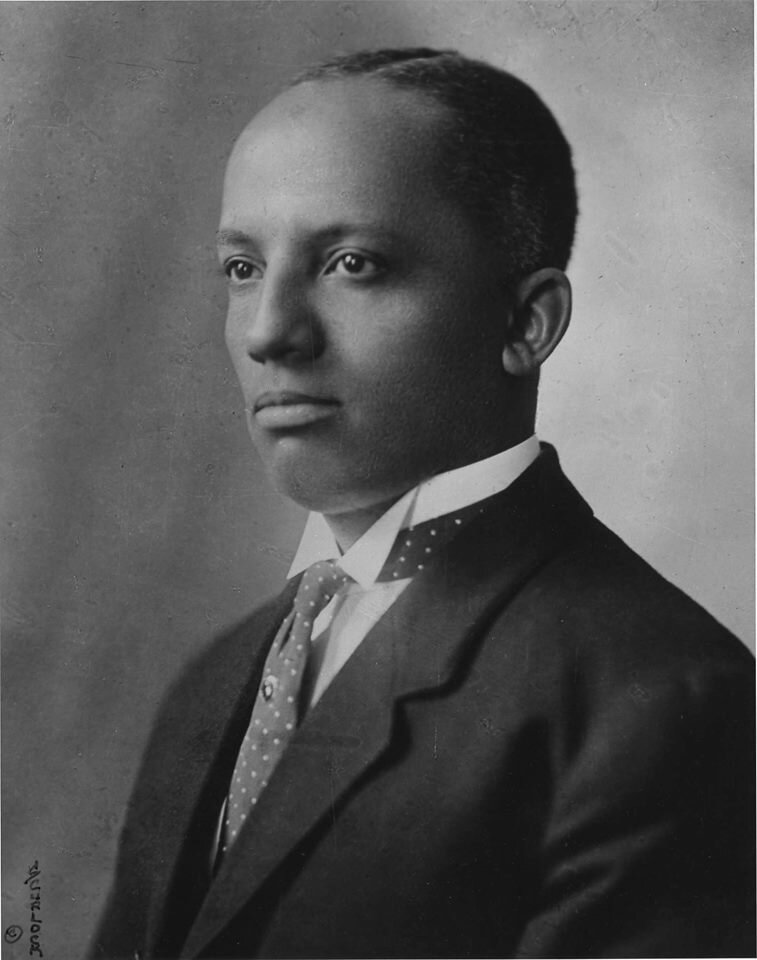Since 1976, every U.S. president has officially designated the month of February in the United States as National Black History Month. Other countries around the world, such as Canada (1995), United Kingdom (1987), and Ireland (2010), also devoted a month to celebrate black history.
Dr. Carter G Woodson
In 1916 Dr. Carter G. Woodson, the second Black American to receive a Ph.D. from Harvard University, began editing the Association’s principal scholarly publication, The Journal of Negro History. Dr. Woodson believed it was important that black Americans have a concrete understanding of their history.
He believed that each black person needed to succeed as a productive member of society in America. Building on his ideas, Dr. Woodson published several books and articles on the contributions of black people toward the development of the United States. He hoped to have all Americans recognize black people as equal and valuable parts of society; Churches played a significant role in the distribution of literature in Association with Negro History Week.
In 1924, Negro History and Literature Week began with Dr. Woodson and his college fraternity, Omega Psi Phi. In 1926, Woodson and the Association for the Study of Negro Life and History announced the second week of February to be “Negro History Week.” The response was overwhelming: Black history clubs grew in size; teachers demanded materials to instruct their students, and progressive whites and other scholars and philanthropists came forward to endorse the effort.
Why February?
Dr. Woodson wanted to honor the legacy of Abraham Lincoln, who issued the Emancipation Proclamation, whose birthday was on February 12. The issue of slavery was complicated when it came to President Abraham Lincoln. He did not agree with slavery, but he said, “My paramount object in this struggle is to save the Union, and is not either to save or to destroy slavery. If I could save the Union without freeing any slave I would do it, and if I could save it by freeing all the slaves I would do it, and if I could save it by freeing some and leaving others alone, I would also do that.”
Also, Woodson wanted to honor Frederick Douglass, an abolitionist, author, and orator. His birthday was on February 14. Dr. Woodson wanted the accomplishments of these two individuals but also the history and achievements of black people, in general, to be incorporated in February.
As early as the 1940s, in West Virginia, a state where Woodson often spoke, blacks began to celebrate February as Negro History Month. In the 1960s, a cultural activist, Fredrick H. Hammaurabi, in Chicago, started celebrating Negro History Month. He used his cultural center, the House of Knowledge, to combine African awareness with the study of the black past.
Before Dr. Woodson’s death in 1950, he believed that black history was too important to America and the world to be limited to a small time frame. He spoke of a shift from Negro History Week to Negro History Year.
If a race has no history, it has no worthwhile tradition, it becomes a negligible factor in the thought of the world, and it stands in danger of being exterminated. The American Indian left no continuous record. He did not appreciate the value of tradition, and where is he today? The Hebrew keenly appreciated the value of tradition, as is attested by the Bible itself. In spite of worldwide persecution, therefore, he is a great factor in our civilization.
– Dr. Carter G. Woodson
When it became Black History Month
In 1969 according to the Kent Stater, Black History Month was first proposed by black educators and the Black United Students at Kent State University and celebrated in February of 1970 for the full month. However, it was not until 1976 that every president designated the month of February as Black History Month. The Association for the Study of Negro Life and History used its influence to institutionalize the shifts from a week to a month and from Negro history to black history. Since the mid-1970s, every American president, Democrat, and Republican has issued proclamations endorsing the Association’s annual theme.
Celebrities on Black History Month
Actor and director Morgan Freeman and actress Stacey Dash have criticized the concept of declaring only one month as Black History Month. Freeman noted, “I don’t want a Black history month. Black history is American history.” Supporters argue Black History Month will integrate much needed cultural inclusion and promote a positive, accepting environment where students can learn the history of a people in a primarily white narrative of history.
In February 2020, Forbes noted that “much of corporate America is commemorating” black history month including The Coca-Cola Company, Google, Target Corporation, Macy’s, United Parcel Service, and Under Armour.
Work Cited
Black History Month – Black History –
HISTORY.com. https://www.history.com/topics/black-history/black-history-month
Gilmour Academy – Wikipedia.
https://en.wikipedia.org/wiki/Gilmour_Academy
Black History Month – Wikipedia. https://en.wikipedia.org/wiki/Black_History_Month
Abraham Lincoln’s Letter to Horace Greeley. https://www.abrahamlincolnonline.org/lincoln/speeches/greeley.htm
ASALH – The Founders of Black History Month | Origins of …. https://asalh.org/about-us/origins-of-black-history-month/
Black History Month | Student Multicultural Center | Kent …. https://www.kent.edu/smc/black-history-month
Ewers, Jim. “Keeping Black History Alive.†The Charlotte Post, vol. 42, no. 23, Charlotte Post Publishing Co., 9 Feb. 2017, p. 4A.
Black History Month – Unionpedia, the concept map. https://en.unionpedia.org/Black_History_Month
american civil war – What is the context of Lincoln saying …. https://history.stackexchange.com/questions/32832/what-is-the-context-of-lincoln-saying-if-i-could-save-the-union-without-freein


